Top 10 Preventive Care Tests You Need at Ages 50 and Above
Preventive care is essential for everyone but most importantly for adults who are in their 50s and above. You may lower the risk of serious illnesses when you take these top 10 preventive tests.
RELATED: Ageism In The Workplace – How to Deal With This When You Are Over 50
10 Health Services You Need In Your 50s | Preventive Care Tests for Older Adults
Click here to jump to the instructographic.
1. Mammogram

According to doctors and disease experts, this is the most important method to find early symptoms of breast cancer. However, there are some discussions on when and how often you must get a mammogram.
The U.S. Preventive Services Task Force (USPSTF) suggests that women aged 50-74 must have this screening test every two years. On the other hand, the American Cancer Society recommends getting it annually.
Additionally, there are other risk factors that you should consider, such as your family history. Those with close relatives who had breast cancer at a young age must think about getting yearly mammograms.
It's still best to ask your doctor to figure out the recommended schedule for you.
2. Bone Density Scan
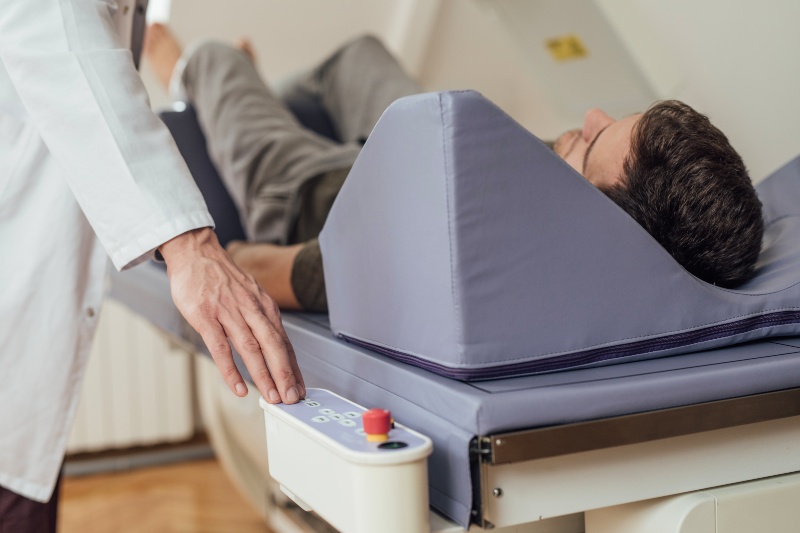
As you age, there's an increased possibility of fractures, leading to deformity, pain, and even disability. Lessen your likelihood of a fracture by getting a bone mineral density scan.
This preventive care test examines the probability of osteoporosis, a condition that makes your bones brittle and weak. It calculates your bone mass which is a crucial measure of how strong your bones are.
According to USPSTF, women aged 65 or older should undergo this scan. However, keep in mind that this is a serious condition for older men, too. Those aged 75 or older are also at risk of fractures, and this screening test may help them as well.
3. Diabetes Test
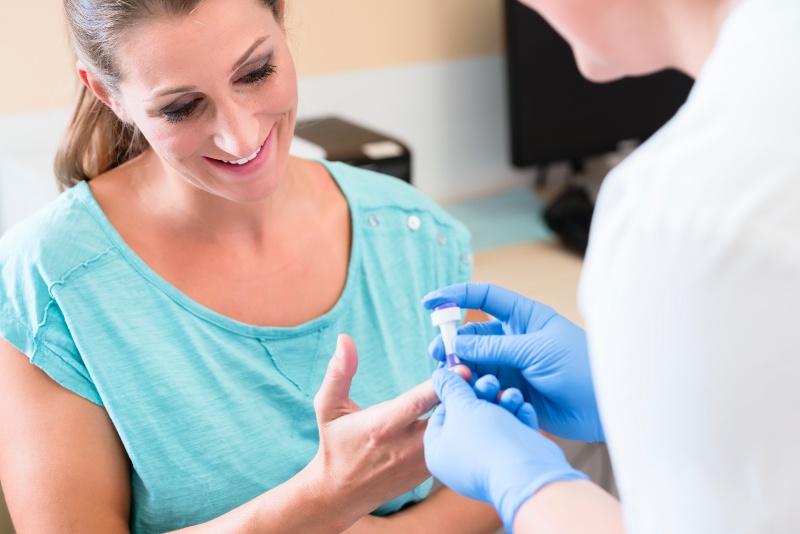
More than 30 million Americans have diabetes, and seven million of those are undiagnosed.
If untreated, this condition can knock down your health. It can result in limb amputation, eye problems, hearing loss, kidney failure, heart attack, stroke, and hypertension.
Depending on your risk factors, you must take this preventive care test annually or once every three years. Consult your doctor to determine the frequency of your screenings.
4. Cholesterol Profile
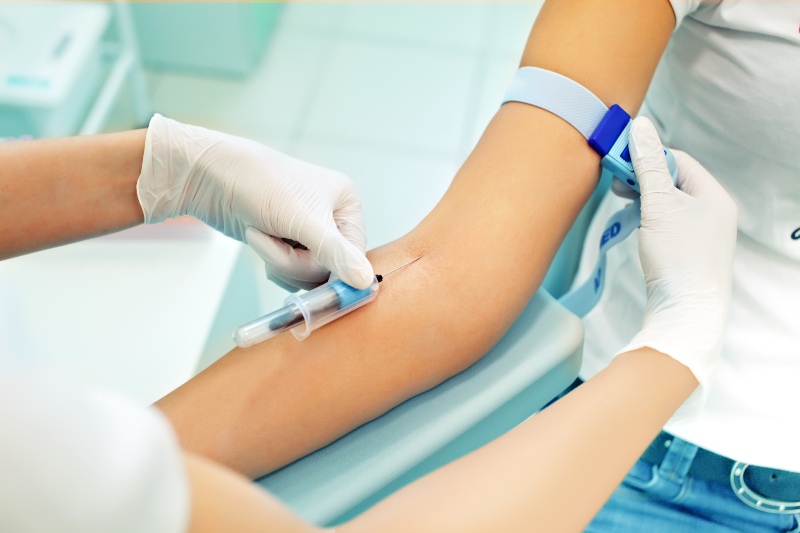
Starting your childhood years, substances such as cholesterol and lipids begin to clog up in your arteries. Over time, this buildup narrows the passageway, and in turn, limits the blood flow to your other organs.
This can lead to heart disease, one of the major causes of death in the US. The amount of cholesterol is one of its key risk factors.
As you get older, your risk of getting heart disease increases. Monitor the health of your heart, and maintain healthy cholesterol levels. By getting a sample of your blood, your doctor can check your cholesterol and the possibility of heart disease.
Keep getting checked at least once every five years. Talk to your doctor should you have changes in your lifestyle, as you may need to get tested more often.
5. Pelvic Exam and Pap Smear
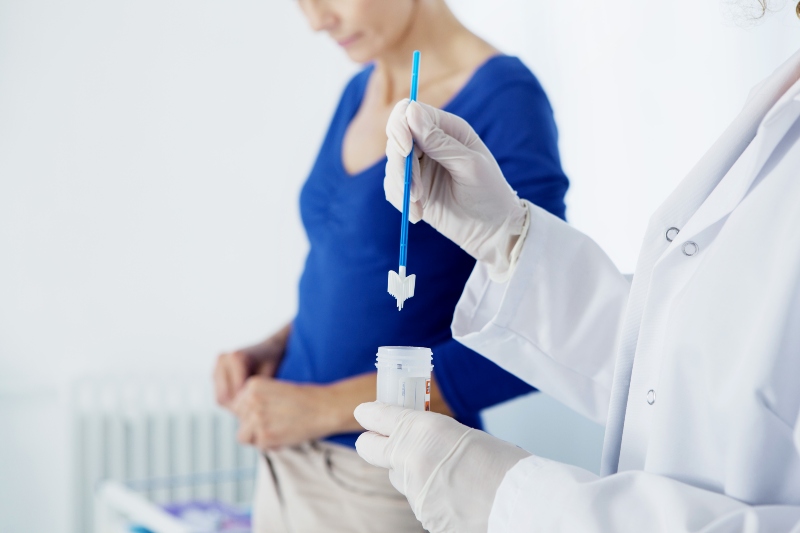
This preventive care can discover unusual cells in your cervix, which may lead to cancer. Regular checkups and routine pap tests can detect cervical cancer early when it's highly curable.
You can take the pap test alone, the human papillomavirus (HPV) test only, or both the pap smear and HPV test. Consult your healthcare provider on which of these screening strategies is best for you.
RELATED: 13 Things To Look Forward to If You're Turning 50 in 2021
6. Depression Screening

Depression is a leading cause of disability, yet it's frequently overlooked. It's important to note that it's not a normal part of aging.
This condition may be difficult to identify because adults may show symptoms that differ from younger ones. For instance, attention or confusion problems caused by depression may appear like Alzheimer's disease.
If you're feeling sad, anxious, or hopeless, think about getting immediate help. Call your doctor who specializes in mental health conditions. Your healthcare provider may conduct a physical exam, interview, or psychological evaluation.
7. Blood Pressure Check

You must check your blood pressure since you might not notice that it's getting high. This can damage your circulatory system and put an end to your brain, eyes, and kidneys. It's also called a “silent killer” because no obvious symptoms will show up until it's too late.
The only way to determine if you have high blood pressure is by measuring it using a blood pressure cuff with a pressure gauge. Any blood pressure below 120/80 is considered within the normal range.
You may take a preventive care test annually. If it becomes elevated, schedule an appointment with your doctor, as he may want to look over it more often.
8. Colon Cancer Screening

Colon cancer is the third leading cause of cancer-related death in the US. Preventive care screenings can help discover it early. Some of these tests include colonoscopy, stool DNA testing, and blood test.
This disease is common in adults older than 50. Your physician will probably mention that you have a test upon reaching that half-century mark. However, if you have other risk factors such as family history, your doctor may suggest an earlier or more frequent screening.
9. Abdominal Aortic Aneurysm (AAA) Screening
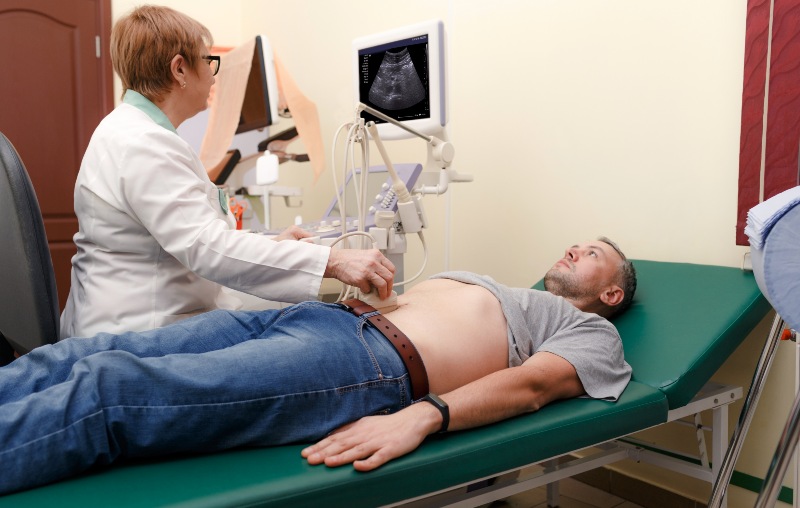
If you're a male aged 65-75 and have ever smoked, you must take this preventive care test. It's a screening ultrasound that checks if a spot in the bottom section of your abdominal aorta has enlarged.
Most of these bumps remain small, develop slowly, and pose no problem. However, a small bulge can be unpredictable. It may rupture, typically with no warning and with a possibly tragic outcome.
Depending on the size of your AAA, tests are recommended either every six months, annually, or every two years.
10. Vaccinations

As an adult, you still need additional immunizations such as:
- Shingles vaccine: Centers for Disease Control and Prevention (CDC) recommends that you get two doses of this vaccine to avoid shingles and their complications. There should be an interval of two to six months.
- Pneumonia vaccine: Additionally, the CDC suggests that you get a dose of pneumococcal polysaccharide vaccine (PPSV23).
- Flu shot: Remember that the approved vaccines for adults are the high-dose and adjuvanted ones.
- Tetanus booster: Adults must get a booster every 10 years or earlier in instances wherein there's dirty or severe burn or wound.
Here’s an instructographic guide. Don’t forget to download, save, or share this handy instructographic for reference:
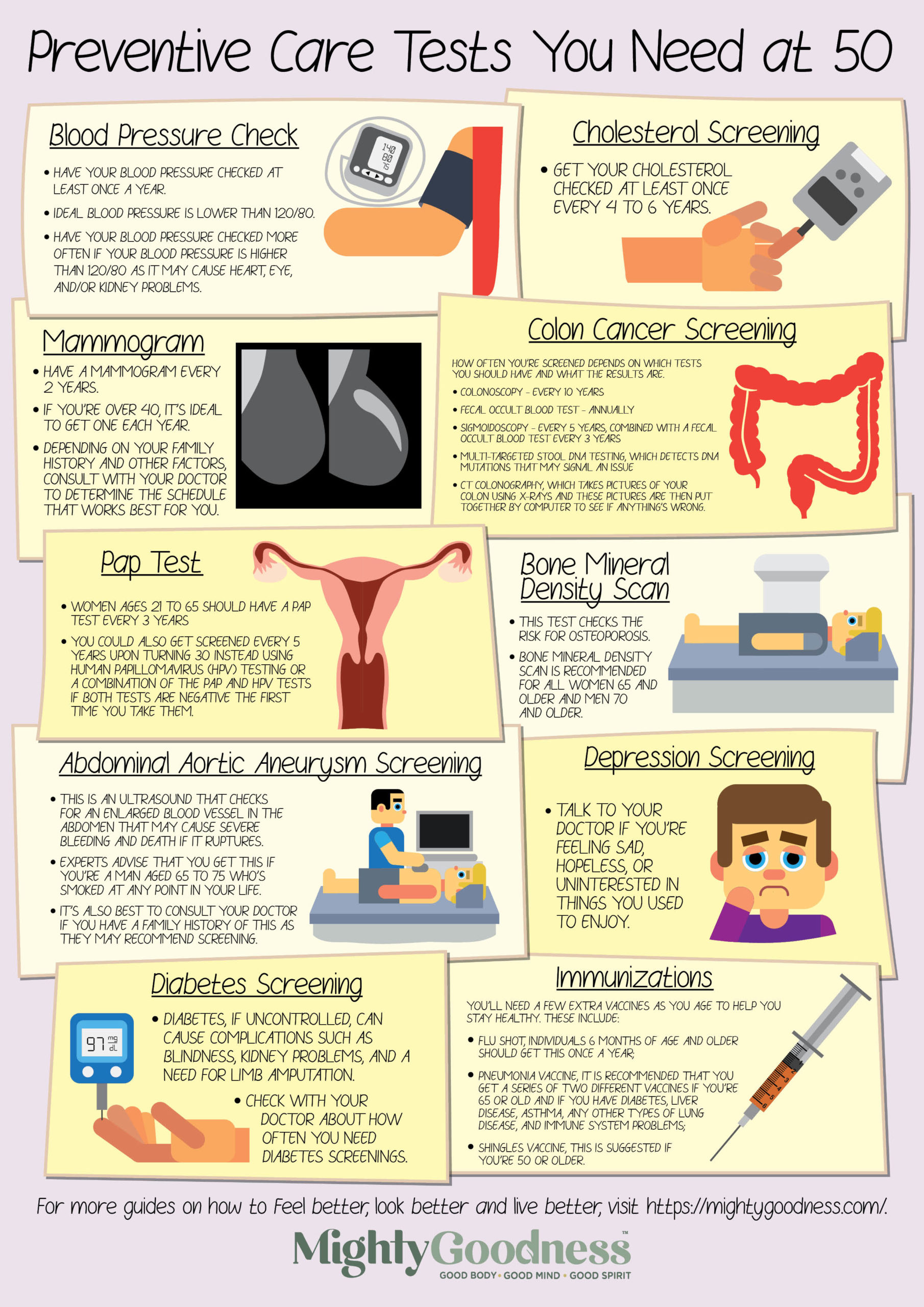
Age may entail problems and diseases, but don't let them take over your life. Monitor your health through these preventive care tests, and let the 50s be the prime of your life.
Apart from taking preventive care tests, it would be best to improve your energy levels to stay fit as you age. Watch this video by Home Care Assistance to know about simple strategies on how you can boost your vitality:
What preventive care services have you already undergone? Please share your experiences with us in the comment section below!
Up Next:
- 9 Lifestyle Changes That Ended My Fear Of Turning 50
- Turning 50 | An Honest Talk About What to Expect
- Testicular Cancer Survivor, Matt Ode, Shares His Story of Hope, Purpose, and “Winning the Day” [PODCAST]
Calling all Health Buffs! If you’ve got the gift of keeping healthy and sharing this knowledge through writing, click here if you want to write for us.
Please stay connected with us on Facebook, Twitter, Instagram, and Pinterest, and make sure to join our community of healthy living and minded people here.
Trending
Tongue Color | 7 Scary Tongue Color Meanings
Lecithin Benefits and Side Effects: 10 Surprising Truths
Get Updates
SIGN UP FOR OUR NEWSLETTER TODAY

Tongue Color | 7 Scary Tongue Color Meanings

Lecithin Benefits and Side Effects: 10 Surprising Truths

Related

Tongue Color | 7 Scary Tongue Color Meanings

